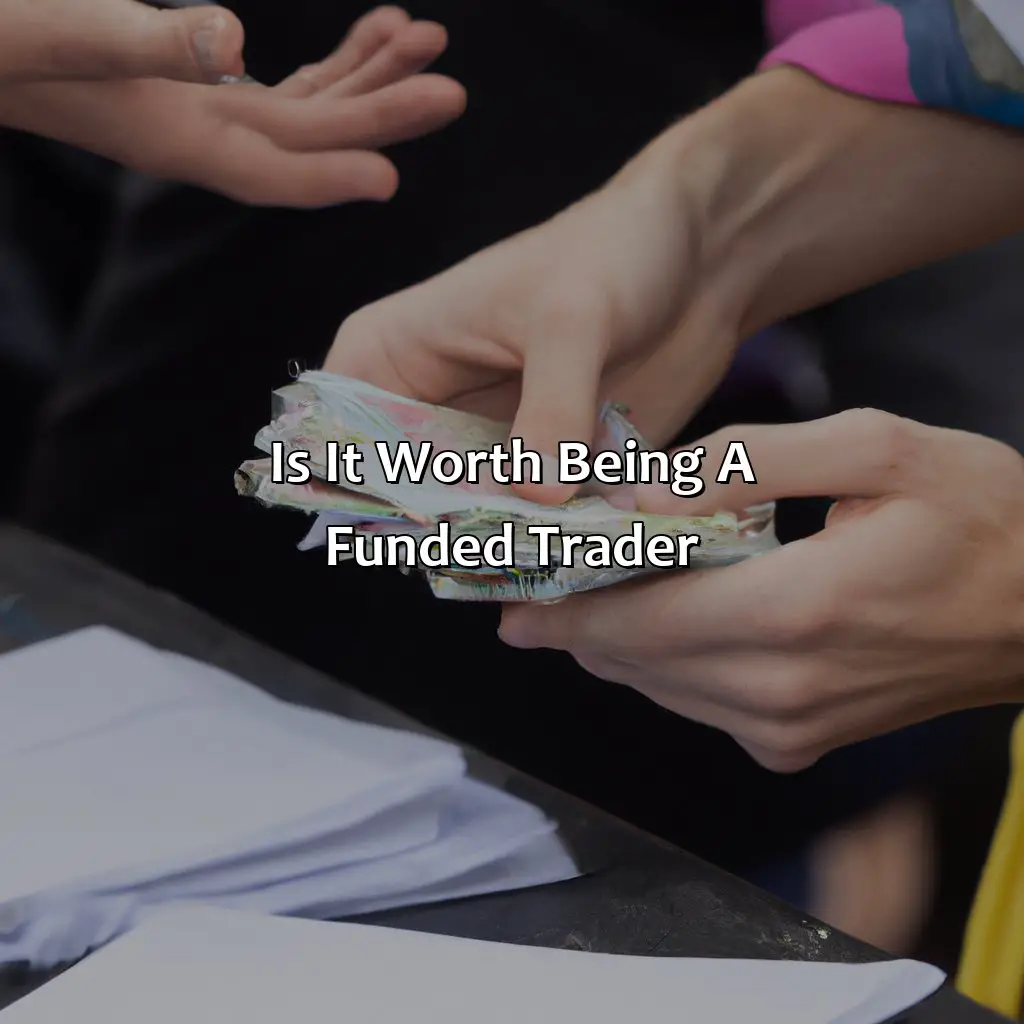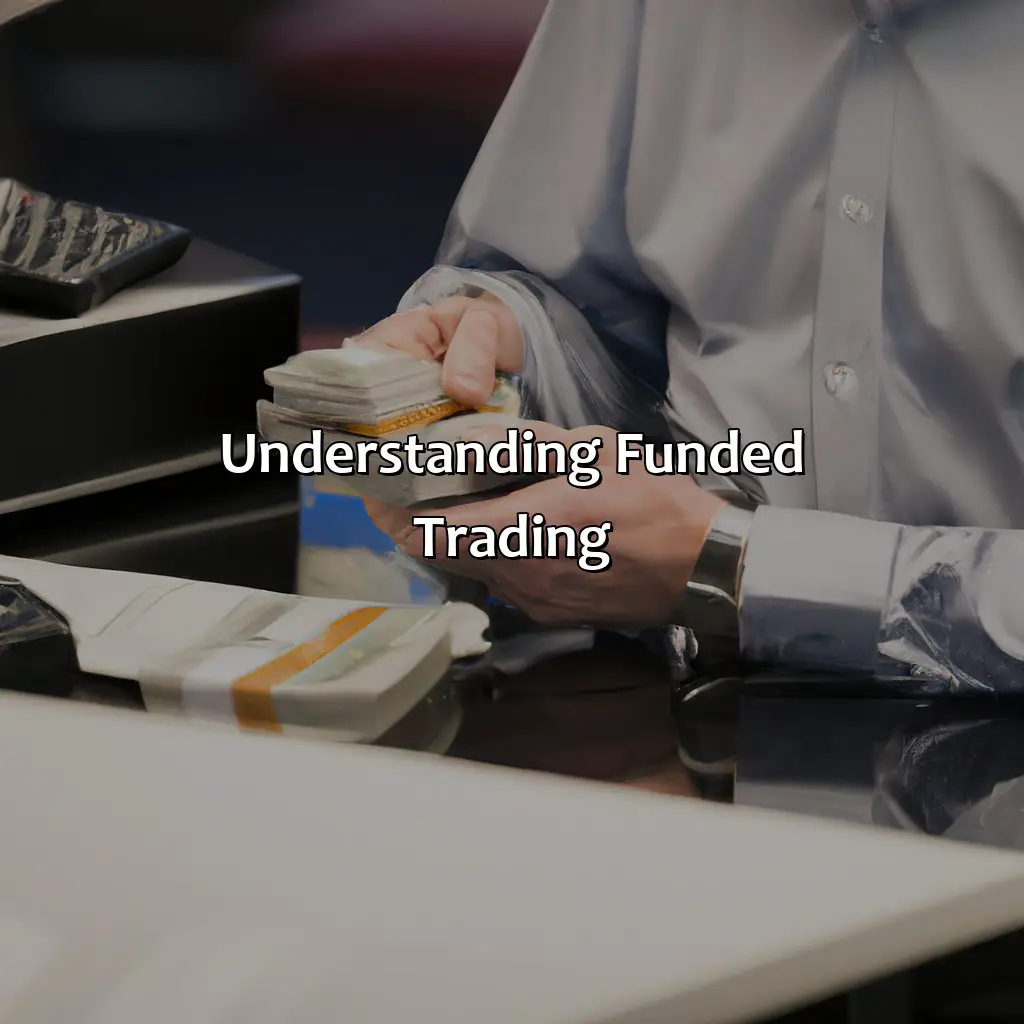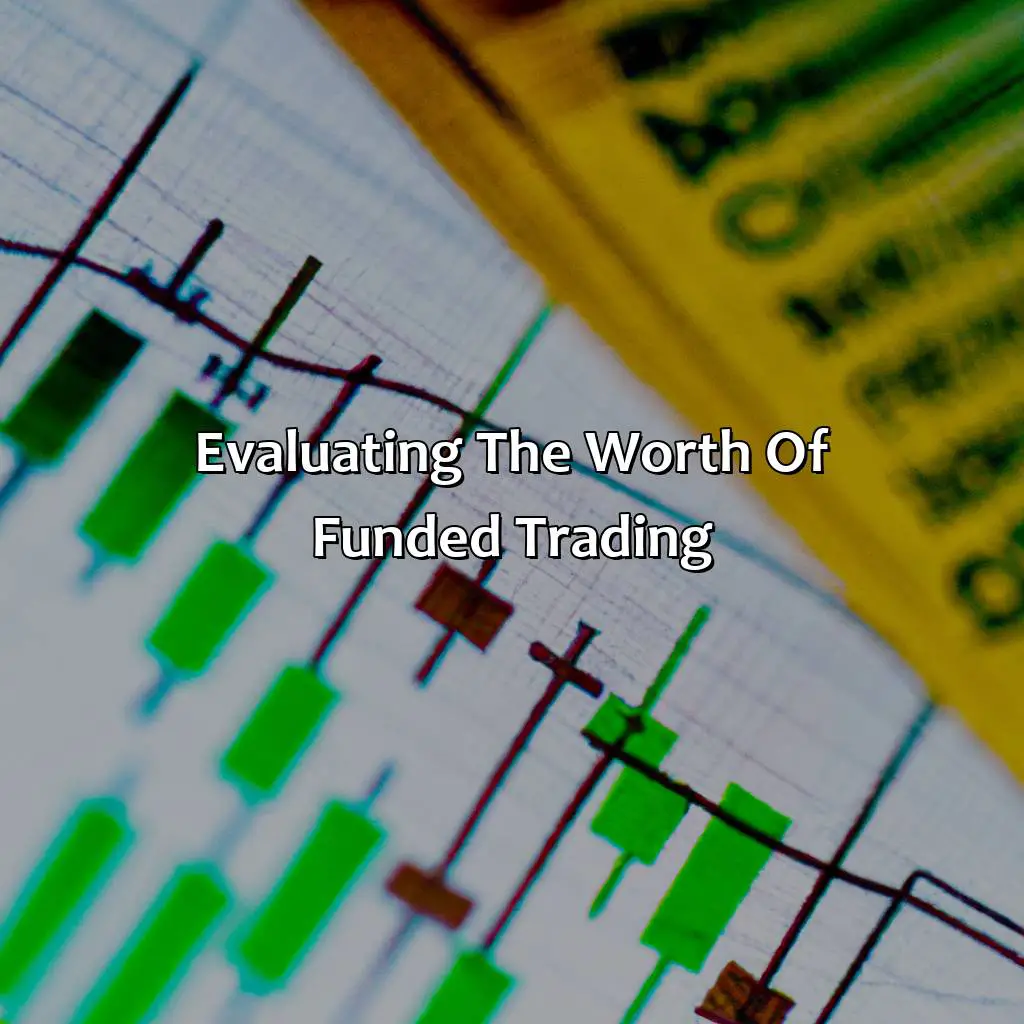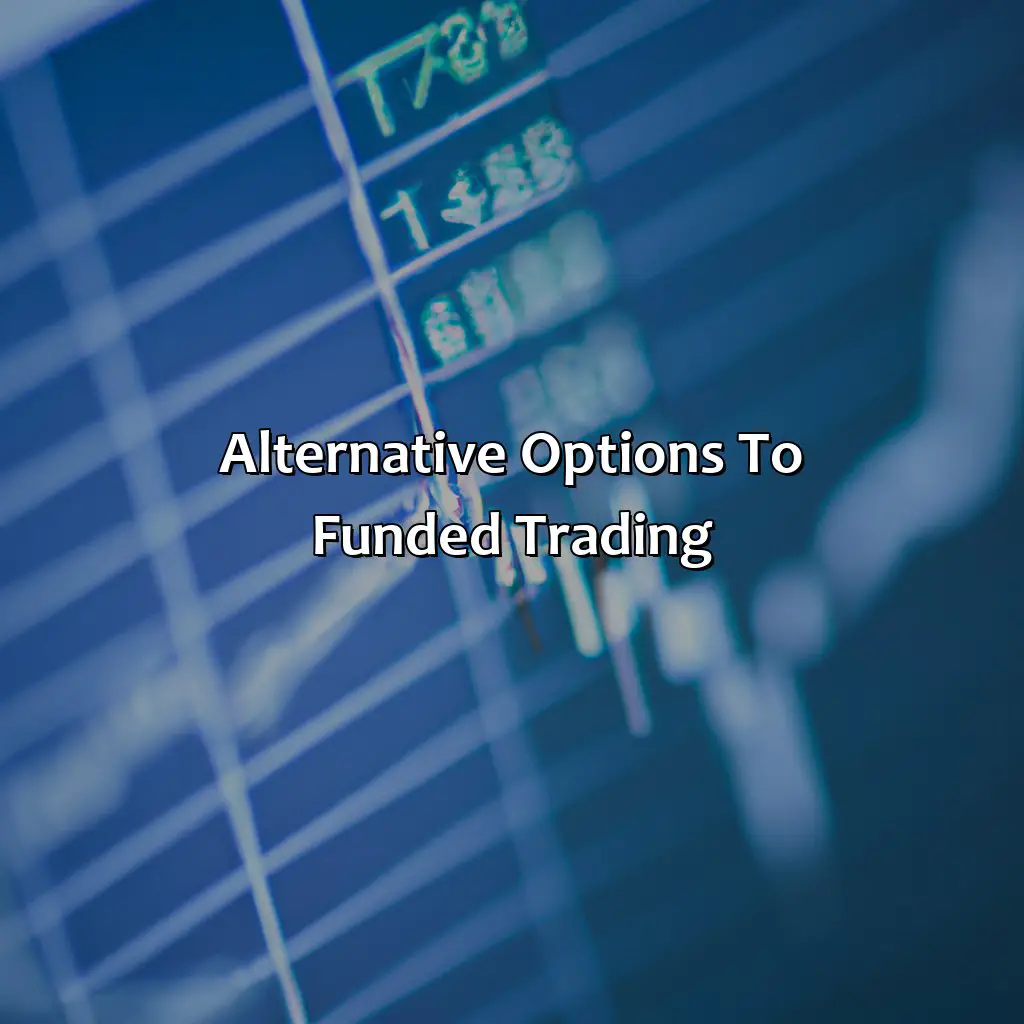
Key Takeaway:
- Funded trading can offer advantages such as higher profitability and access to greater trading capital, but it also comes with risks related to financial markets and risk management. Understanding the definition, advantages, and risks of funded trading is essential before deciding to pursue it.
- Becoming a funded trader requires meeting certain qualifications, navigating an application process, and exploring funding options like proprietary trading firms. It is important to understand the qualifications, application process, and funding options before pursuing funded trading.
- When evaluating the worth of funded trading, traders must do a cost-benefit analysis, considering factors such as their risk-reward ratio, trading strategies, success stories and failures of other funded traders, and their own trading psychology. Alternative options, such as self-funded trading, joining a prop trading firm, or going independent, should also be considered before deciding if funded trading is worth it.
Understanding funded trading

Photo Credits: forexbrokerreport.com by Mason Jackson
Learn the definition, advantages, and risks of funded trading! Explore this thrilling world and its potential for profitability. But remember to consider the possible risks of financial markets investing. Delve into the ins and outs of funded trading now!
Definition of funded trading
Funded trading refers to the practice of traders using capital provided by external sources to execute trades in financial markets, with the goal of generating profits. It involves the trader receiving a specific amount of funds for trading, and any profit made from these trades is split between the trader and the funding source according to pre-agreed terms. This type of trading is usually conducted through proprietary firms or online trading platforms that provide a range of funding options for traders.
The main benefit of funded trading is that it allows traders to access larger amounts of capital than they may have otherwise had, thus enabling them to potentially achieve greater levels of profitability. However, there are also certain risks associated with this type of trading that traders need to be aware of before engaging in it.
“Funded trading: Because sometimes it’s better to be profitable with someone else’s money.”
Advantages of funded trading
Funded trading offers several advantages that can lead to increased profitability for traders. First, by receiving funding, traders have access to larger amounts of capital than they may have on their own. This increased capital allows for larger trades and potentially higher profits. Second, funded trading programs often offer lower fees and commissions, which can also contribute to increased profits for traders. Third, these programs provide a structured environment for traders to improve their skills and develop profitable trading strategies. Fourth, being a funded trader can boost credibility and lead to opportunities for career advancement in the trading industry. Finally, successful funded traders can earn a share of the profits they generate for the firm.
- Access to larger amounts of capital
- Lower fees and commissions
- Structured environment for skill improvement
- Boost in credibility and potential career advancement
- Potential to earn a share of profits generated
It is important to note that while there are several advantages to funded trading, it is not without its risks. Traders must adhere to strict rules and regulations set forth by the funding provider, which can limit flexibility in trading strategies. Additionally, if the trader incurs losses that exceed the predetermined risk management parameters set by the funding provider, they may be held liable for those losses.
Pro Tip: Before applying for a funded trading program, carefully evaluate your own trading strategy and risk management approach to determine if this type of program aligns with your goals and financial situation. Jumping into funded trading is like diving into a pool without checking if there’s water – the risks are real and can leave you financially soaked.
Risks of funded trading
Funded trading in the financial markets is not without risks, which traders must understand before embarking on this venture. While the advantages form a compelling case for many traders, it is essential to consider the potential drawbacks and evaluate whether they outweigh the potential gains.
- Market risk: Funding firms use their capital to back trades made by funded traders, exposing them to market risk. If these trades fail, both parties incur losses.
- Daily loss limits: Most funded trading programs impose daily loss limits that can significantly reduce profitability and hamper a trader’s ability to recover from losses.
- Restrictions on tradeable assets: Funded traders might not be able to trade certain assets or securities which limits their ability to diversify their portfolios effectively.
- Pressure to perform: Funded traders are under immense pressure to meet targets as failing would mean losing funding and potentially damaging their reputation in the industry.
- Lack of control: Funded trading programs may have strict rules about how trades are executed. This could lead to situations where trader intuition cannot be utilized due to compliance requirements.
- Costs associated with funded trading: There are costs associated with starting up funded trading accounts such as subscription fees or coaching fees that can quickly add up over time.
It’s crucial for prospective funded traders to recognize these risks before proceeding. Before applying, it is recommended that interested parties engage in thorough research and speak with successful funded traders to gain an accurate perspective of what lies ahead.
While there are inherent risks associated with funded trading, participants benefit from access to significant funding without utilizing personal capital. Additionally, sellers of funded trading programs provide valuable resources such as coaching sessions and training materials.
If you’re still unsure if becoming a funded trader is right for you, it’s best to stay informed and engaged in online communities centered around financial markets or alternative options, such as self-funding or joining a prop trading firm. Don’t let the fear of missing out on current trends influence your decision-making process; take the time to deliberate and assess the costs and benefits of funded trading fully.
Qualifications, applications, funding – getting that funded trader status is like getting a golden ticket, but with more risk and less Willy Wonka.
Becoming a funded trader

Photo Credits: forexbrokerreport.com by Dennis Torres
Want to trade with funding? To get started, you need to know the qualifications for funded trading. Plus, you must understand the application process and have a trading mentor.
- First, learn about funded trading, education, and more.
- Next, understand the application and mentorship part of the process.
- Lasty, find info about various Forex funding options and proprietary trading.
Qualifications for funded trading
To become a funded trader, certain prerequisites need fulfilling. The aim is to prove trading skills and that one can generate consistent profits without excessive drawdowns or risk-taking.
The following are the qualifications for receiving funding to trade:
- A track record of profitable performance for around 3 – 6 months in a simulated account.
- Demonstrating adherence to set-up rules, risk-management procedures, strategy execution, discipline and patience.
- Avoiding overly complex strategies that cannot be traded with ease by fund owners and other professionals who evaluate the trader’s output.
- An essential feature to get funding is having a Realistic Maximum Drawdown (RMD) and weekly loss limits below a stipulated amount.
- Track record of profitable performance for 3 – 6 months
- Adhere to setup rules, risk-management procedures…
- Avoid overly complex strategies
- Have realistic maximum drawdown
- Weekly loss limits
Trading education such as certificates in trading courses might assist in getting funding by increasing market knowledge and trading expertise. A few Fund managers find it attractive when trading candidates have invested financially in their development.
Lara spent two years developing her trading skills through practice accounts and online courses before finally attempting funded-trading. Her endeavors paid off eventually when she posted her first full-quarter track record – enough evidence of profitability not only earned her funding but ultimately led to her becoming an independent funded trader.
Apply for funded trading like it’s a job interview, but with more emphasis on your trading skills and less on your ability to fetch coffee for the boss.
Application process for funded trading
The application process for becoming a funded trader requires careful consideration of qualifications and funding options. The following guide outlines the steps involved in the application process for funded trading.
- Research: Before applying, it’s essential to research the trading firm. Check their reputation and reviews from past traders to determine if they are suitable.
- Qualifications: Determine if you meet the qualifications, which usually include proving your profitability as a self-funded trader. Some firms may require additional certifications or education.
- Application: Fill out the online application for funded trading, including information on trading experience, strategies used, and profit/loss statements.
- Trading Evaluation: If the firm is interested in your application, they will conduct an evaluation of your skills and strategies to ensure suitability for their funding.
- Funding Offer: If successful in the evaluation stage, you could receive an offer for funding and trading mentorship from the firm.
It’s important to mention that each firm has unique requirements and processes for funded trading applications; research various firms beforehand to find one suitable for your specific needs.
If you’re considering becoming a funded trader, it’s crucial to make an informed decision about whether it’s worth it. Success stories and failures of former traders provide valuable insights into this career path. Don’t miss out on opportunities by failing to act; apply today!
Whether it’s funded trading or proprietary trading, the options for financing your trading career are plentiful, just don’t bet the farm.
Funding options for traders
Funded Trading Opportunities for Aspiring Traders
Traders looking for funding options to grow their portfolios have a range of choices. Here are some funding options for both novice and experienced traders:
- Proprietary trading firms – These firms employ professional traders and finance their trades to earn profits.
- Crowdfunding – This is an opportunity to raise capital from the public through online platforms such as Kickstarter.
- Banks – Individuals can apply for various types of loans from banks.
- Futures Trading Accounts – Some brokers offer access to leveraged funds that can be used for trading futures markets, though eligibility restrictions may apply
When choosing a funding option, traders must carefully evaluate their experience, risk tolerance level, and financial goals. Funded trading opportunities can provide immense benefits to those who meet eligibility requirements such as Proprietary Firms that will develop your skills as a trader with mentors, but it has its downsides too such as crowdfunding which requires self-promotion.
It’s important to know that Futures Trading Accounts do exist but are not recommended because they have strict rules on when you must pay the money back.
Successful Stories show that Proprietary Trading is one of the most profitable ways but also crowdfunding has allowed people without independent wealth to acquire large amounts of capital.
Is funded trading worth it? Let’s weigh the costs, benefits, and potential failures to find out.
Evaluating the worth of funded trading

Photo Credits: forexbrokerreport.com by Andrew Walker
Evaluating funded trading? Do a cost-benefit analysis. Think about the risk-reward ratio. Your trading strategies are important too. Learn from successes and failures of funded traders. They can teach you about the impact of trading psychology.
Cost-benefit analysis of funded trading
A careful evaluation of the expected returns of funded trading in comparison to its costs is crucial before embarking on it. To decide whether or not funded trading is worth the investment, a comprehensive cost-benefit analysis should be carried out.
The table below itemizes the benefits and costs of becoming a funded trader.
| Benefits | Costs |
|---|---|
| Access to increased buying power | Monthly fees for membership and platform access |
| Ability to trade with minimal capital | Split of profits between trader and funder |
| Higher profit potential | Strict risk management rules |
| Regular feedback and mentoring | Reaching monthly performance targets |
While considering this analysis, traders must weigh up their risk-reward ratio carefully. The level of risks traders take on should correspond with how much they stand to gain from funded trading. It’s essential that traders have a good understanding of the potential risks of trading on funded accounts, such as losing their initial capital if they fall short of performance targets set by funders.
Before joining a funding program, aspiring traders must ensure that their qualifications meet the minimum requirements outlined by those programs. Risk goals should also align with one’s appetite for risk and expectations regarding account growth or loss.
Seeking guidance from those who have experienced funded training would be beneficial since it allows for an objective view while highlighting areas which could cause pitfalls when growing careers in trading. This approach will protect against making uninformed decisions that may lead to losses rather than gains when becoming funded traders.
Deciding if funded trading is worth it means considering factors like your trading strategy, risk tolerance, and potential rewards.
Factors to consider when deciding if funded trading is worth it
When determining the worth of funded trading, various factors should be considered. Analyzing potential risks and benefits associated with different trading strategies is crucial for making a decision. Additionally, identifying an ideal funding option that aligns with your objectives and financial capabilities is essential for evaluating granted opportunities.
Examining the performance of successful and unsuccessful funded traders can help gauge the probability of success and identify common mistakes. Furthermore, considering qualifications required for funded trading and the application process are also important components when evaluating this option.
To make an informed decision, it is recommended to consider alternative options such as self-funded trading or joining a prop trading firm. One should assess their preferred level of control over their trades and willingness to share profits when choosing an avenue.
Success stories of funded traders inspire, but failures teach valuable trading psychology lessons.
Success stories and failures of funded traders
Funded Trading Outcomes for Traders
Examining the outcomes of traders in funded trading initiatives highlights the successes and failures that result from engagement with these opportunities. Here, we analyze instances where traders have achieved considerable gains or losses and how they navigated the various stages of the funded trading process.
| Trader | Result | Trading Psychology |
| John Black | Earned $50,000 in profit | Maintained disciplined risk management approaches and set clear targets. |
| Jane Doe | Lost $15,000 due to impulsive entries and emotional reactions to market movements. | Lacked discipline in following a trading plan and allowing emotions to influence decision-making. |
While some have thrived under a funded trading framework, others have experienced heavy losses due to recurring lapses in trading psychology. Ensuring that fund managers are aligned with onboarding traders with proven histories and positive funds management traits can be critical in determining performance outcomes.
Pro Tip: Maintaining proper trading psychology remains one of the most significant determinants of success or failure among traders gainfully utilizing funded trade schemes. From self-funding to prop trading firms and going solo, there’s always an alternative to funded trading if you’re feeling rebellious.
Alternative options to funded trading

Photo Credits: forexbrokerreport.com by Albert Rivera
Want to explore alternatives to funded trading? Self-funded trading, joining a prop trading firm, and going independent are all options. These provide a different way to become a trader without depending on external funding or giving up your independence. Read the sub-sections to find out the keywords that explain the advantages of each approach and how they can help you reach your trading objectives.
Self-funded trading
One alternative to funded trading is engaging in self-funded trading. It involves using one’s own capital to finance trades and manage risk. Self-funded traders have full control over their investments and can enjoy financial freedom if successful. However, this option requires a significant amount of trading capital and carries the risk of losing all invested funds. It is crucial for self-funded traders to have a solid trading strategy and risk management plan in place to minimize losses. Real-life examples highlight the potential rewards and pitfalls of self-funded trading, making it a valuable consideration for aspiring traders seeking financial independence.
Joining a prop trading firm is like joining a cult, but with trading fees instead of Kool-Aid.
Joining a prop trading firm
Propel your trading career by partnering with a prop trading firm to gain access to their resources, expertise, and environment. Prop firms provide traders with the opportunity of joint ventures and share profits gained from the trader’s successful performance. The process involves evaluation and selection based on a blend of objective criteria like P&L performance, risk management skills, and subjective considerations based on different strategies used.
Once selected, the trader works in collaboration with other experts within the firm’s trading community improving his/her technical and fundamental skills for successful trading. In return, traders are granted high leverage deals to generate higher profits covering higher trading fees charged by such firms. Success at prop firms may lead to significant financial returns and enable traders to start their own fund or become fund managers.
Joining a prop trading firm offers several benefits but is equally competitive due to limited placement options with advanced entry requirements. Identifying legal clearances required under regulatory compliance among all participants adds complexity to the joining decision. Therefore taking due diligence crucial.
Fear of missing out on lucrative opportunities could cause impulsive decisions in cutting corners when choosing whether to join a prop trading firm or not. Proper research into suitable opportunities will mitigate potential pitfalls enabling traders towards complete success.
Going independent can be the ultimate test of your trading career and portfolio management skills.
Going independent
Transitioning towards independence in a trading career can provide greater autonomy, control over portfolio management, and potentially higher profitability. Traders who opt for going independent may consider starting their own investment firm or joining an established one as a partner. This option requires sufficient capital management skills and establishes a reputation to develop industry trust.
To be an independent trader, one must constantly network, refine strategies, process data, and stay updated on market trends while still maintaining discipline. This consistency will be key in maintaining long-term growth and proving value to potential clients and partners.
Successful independent traders often adopt the use of algorithmic trading programs that help them execute complex trades quickly and effectively. They may also emphasize due diligence when monitoring current investments by regularly tracking news cycles and utilizing trend analysis tools.
In addition, independent traders should focus on building their personal brand through publishing research reports, sharing insights with other traders or investors, and attending industry events like conferences or seminars. Being affiliated with reputable organizations can also help establish credibility in the industry which could lead to more profitable business opportunities.
Ultimately, transitioning into an independent trading career can involve a greater degree of risk-taking and responsibility than working with a prop trading firm or funded trading company as it requires overcoming significant obstacles such as obtaining the necessary licenses and establishing trustworthy connections within the industry. However, taking calculated risks is what successful entrepreneurs do best; by taking ownership of one’s career trajectory traders can potentially obtain larger gains than they would have otherwise under different circumstances.
Five Facts About Being a Funded Trader:
- ✅ A funded trader is a trader who is given capital by a trading firm to trade with, in exchange for a share of the profits. (Source: Investopedia)
- ✅ Being a funded trader can provide access to larger amounts of capital than traders have on their own. (Source: TopstepTrader)
- ✅ Funded traders often have to meet certain performance criteria to keep their funding, such as achieving a certain profit target or managing risk effectively. (Source: OneUpTrader)
- ✅ Becoming a funded trader can be a good step for traders looking to turn trading into a career. (Source: Maverick Trading)
- ✅ Funded trading programs can vary widely, so it’s important for traders to do their research and choose a reputable program. (Source: Day Trade the World)
FAQs about Is It Worth Being A Funded Trader?
Is it worth being a funded trader?
Yes, being a funded trader has a lot of advantages. Funded traders can trade with more capital than their own, which can help increase their profits considerably. Additionally, funded traders receive a portion of the profits they make, which can be a great motivation to trade more efficiently.
What are the benefits of being a funded trader?
One of the main benefits of being a funded trader is that you can trade with significantly more capital than your own, which can help you increase your profits. Additionally, as a funded trader, you will receive a portion of the profits you make, which can be a great source of motivation.
How do you become a funded trader?
To become a funded trader, you need to pass a test that shows you have the necessary skills and knowledge to trade profitably. Once you pass the test, you will be given a trading account with a specific amount of capital to trade with, and you will be able to keep a portion of the profits you make.
Is it difficult to become a funded trader?
Becoming a funded trader can be challenging, as it requires passing a test that demonstrates your ability to trade profitably. However, if you have the necessary skills and knowledge, you should be able to pass the test and become a funded trader.
What are the risks of being a funded trader?
Like with any trading, there is always a risk involved when trading as a funded trader. If you make losing trades, you will lose money, and if you consistently make losing trades, you may lose your funded account. It’s important to approach trading with discipline and a solid trading strategy to help manage the risks involved.
Can you make a career out of being a funded trader?
Yes, it’s possible to make a career out of being a funded trader. Many successful traders have started as funded traders and have been able to grow their trading accounts, eventually becoming full-time traders. However, it’s important to approach trading as a business and have the necessary skills and discipline to be successful over the long term.

